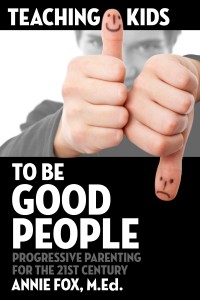|
|
February 28, 2013
As a published author, of course I know about book tours. Not that I’ve ever actually been on one, but I’ve attended other authors’ events at Book Passage. So, yeah. I understand the concept. What I didn’t get, until recently, is “What’s a blog tour?” Turns out it’s pretty much the same thing as a book tour without the books, the bookstore, or the fans eager to buy an autographed copy.
 Not all teachers are parents, but all parents are teachers Since I’ve got a new book I’m rather proud of and zero publicity budget, starting today, I’m on the (virtual) road with the Teaching Kids to Be Good People Blog Tour (Feels like we need a theme song. I’ll work on it.) At each of the nineteen stops along the tour, there is no stump speech. You, my dear readers, will be treated to totally new and thought provoking content to help us 21st century parents raise nice kids who also do good in the world.
Here’s where you can find me and when:
 I know it's a virtual tour, but I want this bus! Teaching Kids to Be Good People Blog Tour Itinerary
Got the T-shirt:
February 28 – Suzanna Narducci’s blog at TweenParent.com
February 28 – Heather Chauvin’s blog (video interview)
March 5 – Kelly Hirt’s blog My Twice Baked Potato
March 7 – Jean Tracy MSS’ Parenting Skills Blog
March 10 – Jeanne Demer’s The Ruby Books
March 16 – Rick Ackerly’s blog at Genius in Children
March 18 – Margit Crane and Barbara Dab’s Good Enough Parenting Radio Show
March 18 – Sharon Silver ‘s blog at Proactive Parenting
March 19 – Families Magazine Southwest (UK)
March 20 – Sue McNamara at 6seconds.org
March 21 – Kristen Ploetz’ Little Lodestar
March 27 – AK Stout & Deb Evans‘ Social Geek Radio 6 pm (PT)
March 28 – Bruce Sallan’s #DadChat “Doing the right thing is good karma” (on Twitter) 6 PM (PT) Enter TweetChat room
March 29 – Lynnee Jimenez’s ClubChicaCircle.com
April 1 – Melissa Wardy’s blog at PigtailPals
April 8 – Keith Rispin’s Parenting Old School blog as well as Keith’s Ed Tech blog
April 15 – Carrie Goldman’s blog Portrait of an Adoption
April 19 – Sarah Newton’s blog at Sarah Newton.com
April 29 – Dr. Laura Markham’s blog at Aha Parenting
A big thank you to all my blog tour hosts. These are top-notch folks. All of them are authors, educators, clinicians, and/or parent coaches who do truly excellent work supporting kids, parents, and families. I’m honored to be on the same team with each of them and I encourage you to explore their books and services. We’re all here together to help each other as we help our kids.
OK, the blog tour starts now. Wait!! How’s my hair look? Oh, right. It doesn’t matter. :O))
Happy Parenting! (And if you feel the urge, please sign the guest book.)
 We're in this together!

February 21, 2013
I originally wrote a version of this article for TakePart.com where I contribute a weekly education post. Check out the rest of my articles there.
 Tea and Sympathy When kids start school a piece of us leaves with them every morning. When they return, we’re eager to hear about their day so we can reconnect emotionally and gauge how they’re doing out in the world.
When asked, “How was school?” kids who are natural talkers will overflow with details. Others will simply say, “OK.” End of conversation. At that point, a wise parent would smile, nod, and let the day’s dust settle. Later, patience may be rewarded as the child reveals bits of news over the course of the evening. Either way, most parents love hearing about their elementary school children’s successes and disappointments. We also delight in every chance we get to offer encouragement and advice when needed. These interactions just may be the juicy heart of parenting.
By middle school, however, kids tend to be more guarded when they talk about things that happen away from home. Of course, parents and kids still need to connect, but our part of the conversations should factor in an appreciation for their ongoing need to keep parts of their lives private as they transition into young adulthood.
Let’s say you do respect your kids’ boundaries, but you’re still frustrated with the lack of information you get about what’s going on in school. A good way to improve communication is to:
1. Show that you’re interested. This point seems so obvious I almost didn’t include it, but then I got a teen email tailor-made for this article:
Dear Annie,
My parents never ask how I’m doing. They just walk in and complain about how their day was terrible. Then I think, “Why won’t you ask your two lovely daughters how their day was?” When they decide to ask, I just get awfully nervous. I feel as if I say the wrong thing I’ll get judged.”
–Cutie Klutz
Sounds like this family is missing good opportunities to connect with each other. And I’m guessing Mom and Dad aren’t even aware they’re being perceived as disinterested and “judgmental.” Cutie has offered an overlooked perspective: that of a child who wants to talk but feels her parents don’t want to listen. Food for thought.
Moving on…
2. Give kids time to decompress. Talk is more likely to flow naturally after the shoes come off, food’s dished out, and everyone has had time to relax and be at home.
3. Be a safe person to talk to. Kids have lots of feelings about what happens during a typical school day. Talking about feelings helps us understand ourselves and other people better. When your kid wants to talk, unplug, open your heart and mind, and dial back your inner judge way back. Also try not to poo-poo your child’s challenges as “kid stuff” nor to leap into “I’ll handle this” mode. Parenting is nothing if not a balancing act.
4. Be a good listener. That’s the hallmark of every good parent. In fact, during the teen years, the most effective parents often report how they’ve learned to “talk less and listen more.” Excellent advice for anyone who wants a child to talk more. Also useful for anyone who wants to teach kids that we show we care about others by listening with an open heart and mind.
5. Model what you want. If you want your child to share more with you then how about if you get into the habit of sharing more with him/her? For example, over dinner you might say, “Today was tough. One of my coworkers always interrupts me at meetings. It’s really annoying. You know?” This simple, open-ended question might prompt your child to commiserate and share about a challenging peer relationship s/he’s dealing with. Authentic conversation on!
In case you’re wondering how I responded to Cutie Klutz, here’s my reply:
Dear Cutie,
We all want and need to be listened to– especially by the people we love. Since sharing anything with your parents makes you “awfully nervous,” how about starting with something small, simple, and positive? Like, “I talked to this new girl from Wisconsin. She’s cool.” Or, “I got an A on my Spanish test. I studied really hard so that felt good.” I hope you try this, Cutie, because your Mom and Dad love you. If you give them a chance to chill for a bit after work and you challenge yourself to speak up a bit more, they just might become better listeners. I hope so!
In friendship,
Annie

February 14, 2013
 Love is all around. Take what you need. Give what you can. David and I have celebrated a lot of Valentine’s Days together… so much chocolate! I appreciate how our partnership contributes to my health and well being. It makes so much of what I do possible. I also especially appreciate how our relationship continues to get better. How can that be? We work at it. A lot. We’re not aiming for perfect, only progress in the direction of more kindness, compassion and fun.
And so, on this Valentine’s Day, I thought I’d share what I’ve learned about love after 38 years of marriage. Take what makes sense to you. Leave the rest. I hope it helps in whatever ways you need.
- It’s not about who you love, it’s about how.
- If it’s getting in the way of being together, as friends and lovers, talk about it.
- Be totally trustworthy and require the same from your partner.
- Look for opportunities to ease your partner’s mind and tight shoulder muscles.
- Turn off the Opinionator and listen with an open heart and mind.
- From time to time, just clean up someone else’s mess without expecting an Academy Award.
- Don’t cheat… ever.
- If you or your partner has created a break in trust, do what makes sense to learn from it and move on… if you can.
- Be a safe person for your partner to show his/her vulnerability and strength.
- Show that you know and understand who s/he really is.
- “Let’s go for a walk” is a lovely thing to say.
- Do the dishes, even if it’s not your turn.
- Nurture the romance and the friendship because the kids will grow up and leave.
- Make food together and enjoy what you’ve dished up.
- Don’t look for perfection only progress… in yourself and your partner.
- Find at least one thing, outside of the house, that you enjoy doing together and do it… regularly.
- Put down the damn phone iPad, Kindle, laptop and hold each other close.
- Bring home an occasional surprise treat as a “just because” gift of love.
- Anger comes in two varieties… the clean kind (I’m upset & here’s why) and the dirty kind (You ALWAYS do this!) Keep it clean.
- Use your love for your partner to give your best self. It’ll become ingrained and then you can give it to everyone.
- Be nice. Save the contempt for… actually, don’t save if for anyone.
- Share that last chocolate chip cookie.
- When your lover wants to talk about something that’s important to him/her (but not to you), stop and LISTEN with genuine interest.
- When a hug is given, hug back, no matter how crappy a mood you’re in. It’ll make you feel better.
- Show appreciation. Even after years of being together, “Please” and “Thank you” are signs of caring.
- Unplug when you’re with your sweetie and be where you are. It shows “You matter to me more than checking FB.”
- Fill up the gas tank because you know your partner needs the car tomorrow.
- Making your honey a snack is an act of love.
- Make eye contact and a smile when s/he walks into the room.
- Dark chocolate. Lots of it to share.
- When your lover is out in public playing a sport, performing, presenting, be front & center, cheering him/her on!
- Let there be togetherness in your chores. Cleaning up, doing laundry, shopping is sweeter when you’re doing it together.
- When your lover looks great, tell him/her. When s/he has had better days, do NOT say a word!
- If your lover is under the weather (or on a work deadline) do more than your share around the house with a smile.
- If you notice your honey has spinach bits between teeth or (horrors!) a booger… speak up (discreetly, of course!)
- Foot rubs are such a gift!(if you like having your feet touched) Otherwise… ask what else would feel better.
- Be helpful, without being asked.
- Listening with an open heart and an open mind leads to understanding. Understanding increases love.
- Say the words “I love you” like you really mean it. Yes, from time to time, we all need to hear the words.
- A gift is most appreciated when it reflects how well you know and understand your sweetie.
- Flirting with anyone other than your sweetie is disrespectful to your lover and your relationship. Just don’t. If you find your affections wandering, take it as an opportunity to make the relationship stronger. Say, “Honey, I need more _____ from you.”
- Dark chocolate… wrapped or unwrapped. Lots of it. Frequently. Share.
- Forgiveness is a gift to you, your partner, and the relationship. Let go of resentment or it will poison everything.
- Be the kind of partner you’d like your partner to be.
- Show how much you appreciate having him/her in your life. Not just on Valentine’s, but every day
- Your kids learn about love and loving by the way you treat them and by the way you and your partner treat each other.
- When your partner is worried don’t say, “That’s ridiculous!” (even if it is.) Just be there with support and encouragement.
- Look for opportunities to be helpful. Don’t wait to be asked.
- Smile at your sweetie. It sends a great message and you always cuter when you’re happy.
- Do something special together today to celebrate your love. We all need that from time to time. This would be a good time. Enjoy.
Happy Valentine’s Day from our hearts to yours!


February 6, 2013
 "I'm sorry, Daddy. I didn't know." When a very young child intentionally hurts another, how do we respond? With outrage and anger? Threats and intimidation? None of the above. Young children are ignorant, as in, they don’t know any better. Instead of shouting, a caring adult needs to step in and say to the child, “When you do that, you hurt others. When you hurt others you hurt yourself. The next time you feel so upset that you feel like doing harm, come to me. Let’s talk and work together. I can help you learn to handle those big feelings in safer ways, so that you can be a helper, not a hurter.”
When adults treat children in this respectful, compassionate way, children learn to be compassionate. But when adults respond to a child’s ignorance with anger…. how can they possibly learn about compassion?
When older children and adults behave cruelly it’s harder to view their actions through the “ignorance” lens, but it still applies. When we intentionally harm others, we are, in that moment, blindly ignorant of the hurt we cause. If, in that moment of harming, we had known better we would have done better. That’s why, whenever we get our buttons pushed and are about to lose it we need to calm down and wake up just enough to recognize the damage we are contemplating. And in that moment of pause, we realize that we do, indeed, know better.
All teachers are not parents, but all parents are teachers. Teaching kids to be good people includes teaching them how to manage their destructive emotions in constructive ways. When we witness cruelty between kids we need to summon compassion. Through our compassion for their ignorance we can help children become wiser.

| |


















